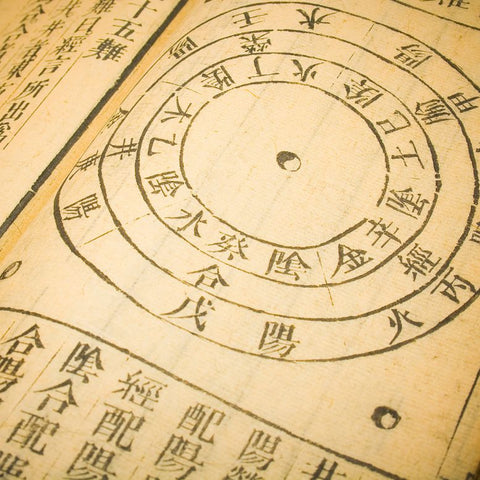your basket
- choosing a selection results in a full page refresh

In the ancient practice of Traditional Chinese Medicine (TCM), health and wellbeing are viewed through the lens of a profound mind-body connection. Unlike the Western approach that often separates the mind and body, TCM recognises that emotions play a crucial role in shaping our physical health. According to TCM principles, emotions are not solely confined to the realm of the mind but also have a profound impact on the body's functioning.
In TCM, emotions are considered an integral part of a person's overall health and wellbeing. Emotional imbalances, if left unaddressed, can disrupt the body's energy flow, or Qi, leading to physical disharmony and disease. TCM acknowledges that each emotion has its own unique energy, and when emotions become excessive or prolonged, they can manifest as symptoms or imbalances in specific body parts.
Within the framework of TCM, there exists a fascinating correlation between specific emotions and their impact on corresponding body parts. For instance, anger is associated with the liver, joy with the heart, overthinking with the spleen/stomach, grief with the lungs, and fear with the kidneys. Understanding this interconnectedness allows TCM practitioners to diagnose and treat not only the physical symptoms but also the underlying emotional causes.

In this blog, we will delve deeper into the intricate web of emotions and body parts in TCM, exploring how specific emotions can affect our health and wellbeing. We will uncover the wisdom of TCM's Five Elements Theory, which provides insights into the emotional associations of each element and their influence on particular body organs. Additionally, we will explore the meridian system, a network of energy pathways in the body, and how emotional imbalances can disrupt the flow of Qi, impacting the corresponding meridians and body parts.
By gaining a greater understanding of the connection between emotions and body parts in TCM, we can embark on a journey of holistic healing and strive for balance in both our emotional and physical wellbeing. So, let us unravel this fascinating interplay and discover how TCM offers profound insights into nurturing our mind, body, and spirit.
Central to Traditional Chinese Medicine (TCM) is the Five Elements Theory, also known as the Five Phases or Wu Xing. This theory provides a framework for understanding the dynamic interplay and relationships between different aspects of nature, including the human body and emotions. The Five Elements—Wood, Fire, Earth, Metal, and Water—are not merely physical substances but represent energetic qualities and processes in TCM.
According to the Five Elements Theory, each element is associated with specific organs, meridians, seasons, colours, and emotions. By understanding the attributes and interactions of these elements, TCM practitioners can diagnose and treat imbalances in the body and emotions.
Understanding the emotional associations of each element allows us to identify patterns of disharmony and recommend treatments that address both the physical symptoms and emotional imbalances. By restoring harmony to the corresponding organs and balancing the associated emotions, TCM aims to promote overall wellbeing and vitality.

In Traditional Chinese Medicine (TCM), the meridian system forms an essential component of the body's energy network. Meridians are pathways through which Qi, the vital energy, flows throughout the body. These meridians connect various organs, tissues, and body parts, facilitating the balanced circulation of energy and maintaining overall health and harmony.
Here we explore the specific meridians and the emotions which connect each body part. We’ve also cited specific Bach flower remedies that can support each of these emotions which may be useful in helping to rebalance these specific meridians.
For more information on Bach flower remedies, you may be interested in What are Bach flower remedies?
The Liver meridian plays a crucial role in regulating the smooth flow of Qi and blood throughout the body. Emotionally, the Liver is associated with anger, irritability, and emotional stagnation. When emotions such as anger or frustration become excessive, they can disrupt the flow of Qi in the Liver meridian, leading to symptoms like headaches, menstrual irregularities, muscle tension, and digestive issues.
Bach flower remedies:
The Heart meridian is responsible for circulating Qi and blood throughout the body. Emotionally, the Heart is associated with joy, love, and excitement. When emotions are imbalanced, such as excessive joy or lack thereof, the Heart meridian's flow can be affected. This imbalance may result in symptoms like palpitations, insomnia, anxiety, and poor memory.
Bach flower remedies:

The Spleen meridian is connected to the digestive system and plays a role in transforming and transporting nutrients. Emotionally, the Spleen is associated with overthinking, worry, and excessive mental activity. When these emotions become overwhelming, they can impair the function of the Spleen meridian, leading to digestive disorders, fatigue, weakened immunity, and a sense of mental fog.
Bach flower remedies:
The Lung meridian governs the respiratory system and is responsible for the exchange of oxygen and vital energy. Emotionally, the Lungs are associated with grief, sadness, and longing. When grief remains unresolved or becomes excessive, it can disrupt the flow of Qi in the Lung meridian, potentially leading to symptoms like respiratory problems, weakened immune function, and a tendency to develop frequent colds or infections.
Bach flower remedies:
The Kidney meridian is closely linked to the overall vitality, reproductive system, and bone health. Emotionally, the Kidneys are associated with fear, insecurity, and lack of willpower. Chronic fear or excessive anxiety can deplete the energy of the Kidney meridian, manifesting as symptoms such as adrenal fatigue, hormonal imbalances, weakened bones, and lower back pain.
Bach flower remedies:
Understanding the connection between specific meridians and emotions allows TCM practitioners to identify imbalances within the body-mind system. By focusing on rebalancing the flow of Qi and addressing the underlying emotional causes, TCM treatments aim to restore harmony and support overall wellbeing.
Create a personalised Bach flower remedy blend
As well as Bach flower remedies, there are a variety of techniques and modalities aimed at rebalancing emotions and promoting overall wellbeing. These techniques focus on harmonising the flow of Qi, restoring emotional balance within the body and addressing the root causes of emotional imbalances. Let's explore some of the key TCM techniques used for balancing emotions:

By integrating these techniques into one's lifestyle, individuals can support the harmonious interplay between emotions and physical health, leading to improved emotional wellbeing and overall vitality.
Traditional Chinese Medicine (TCM) and Western medicine are two distinct approaches to healthcare, each with its own strengths and limitations. While Western medicine excels in acute care and advanced medical interventions, TCM offers a holistic perspective that considers the interplay between the mind, body, and spirit. Rather than viewing them as competing systems, many healthcare professionals and individuals are recognising the potential benefits of integrating TCM and Western medicine to provide comprehensive and personalised care.
Here, we delve into the complementary nature of these two approaches:
In conclusion, TCM and Western medicine offer unique perspectives and approaches to healthcare. By recognising their complementary nature and integrating the strengths of both systems, individuals can benefit from a more comprehensive and personalised approach to health and wellbeing.
If you’d like to learn more about Bach flower remedies, we invite you to explore our website further. Here are a few links that might be useful:
Bach flower remedies for beginners
Create a personalised Bach flower remedy blend

Since 2021, Lucy Edwards, a qualified Bach Flower Practitioner and the driving force behind Mindful Remedies, has connected with clients across the world. Crafting thousands of personalised remedies, Lucy has supported individuals' emotional wellbeing, shipping remedies to far-flung places like the USA, Thailand, and Australia.
Lucy is readily available for conversations, offering personalised advice to guide you on the path to holistic wellness. It's important to note that she's not only qualified but also registered with the Bach Centre, ensuring that every consultation and remedy adheres to Dr Bach’s original guidelines for expert care and efficacy.
Exclusive pricing 20% off your first subscription order and 5% off all future orders
VIP treatment Receive personalised advice from Lucy, free gifts & 15% off gift vouchers
Easy to manage Edit remedy, change schedule, pause or cancel at any time
Exclusive online workshops Access to workshops focusing on emotional wellbeing, guided by Lucy
Early access to new products Be the first to try out new remedies or wellness products, before anyone else



